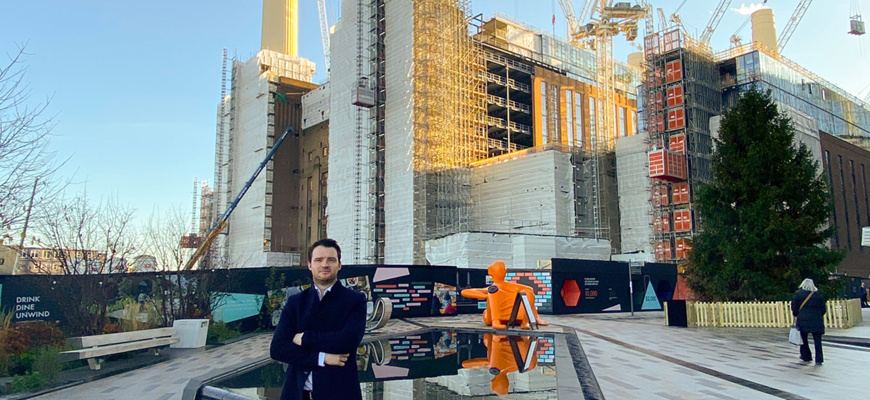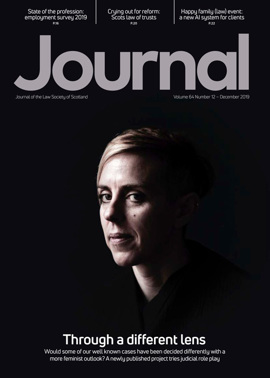Powered by passion

Tell us about your career path to date. How have you got to where you are now?
My undergraduate degree was the BSc (Hons) in Construction Management, during which I was sponsored by Sir Robert McAlpine Ltd. The experience I gained on-site during the sponsorship sparked a passion for construction. I qualified as a lawyer in 2011 after the postgraduate LLB, diploma, and traineeship at McClure Naismith, and moved to Burness Paull (then Paull & Williamsons) in 2012. I joined Battersea Power Station Development Company (BPSDC) in 2015 and was appointed as Legal Director for Construction in 2019.
It sounds like your undergraduate degree and work experience outside of the legal sphere has really shaped your career. How important has it been to have a passion that goes beyond the law?
I think it is very important – market knowledge and technical expertise are hugely important in establishing credibility within a very competitive environment, but more generally doing anything is easier when you actually enjoy it. For that reason, I am also a big believer in law as a postgraduate qualification on top of a technical degree, building on the underlying discipline.
I am very grateful for having had the opportunity to work with some very talented people both in construction and in law who have been generous with their knowledge and advice.
Battersea Power Station is a truly iconic landmark. How does it feel to be involved in such a major regeneration project?
I am immensely proud to be part of the team restoring this icon of our collective industrial heritage and creating a world-class mixed-used development. The project is one of the biggest of its type in Europe, extending beyond the grade II* listed building to the wider 42 acre estate. Whether we are having foundries ramping up their operations to produce over a million new bricks for the power station restoration works, or dismantling and rebuilding the iconic chimneys exactly as they were originally made, the challenge is huge, but is more than matched by the ambition of our shareholders and the team they have assembled. There have been well publicised false starts for this development but, as is clear to anyone who has seen recent progress, the power is very much back on at Battersea.
What motivates you when you head to work?
There is a strong culture of “Team Battersea” which is driven from the very top of the organisation – this is really important and drives people to do the best they can for themselves and for the wider team. There is also huge variety in my role, ranging between advising on construction contracts, negotiating agreements for lease with prospective tenants, working with our lenders and investors, and providing legal advice to inform the procurement strategy for future phases of the development.
What was the biggest challenge or change for you when you moved in-house? What has been the greatest reward?
Without going into the detail (and probably one for the construction lawyers), I was part of the team that led the change in procurement on the power station from design and build to construction management. This would have been a huge change in normal circumstances, but doing so when we had already procured and delivered a considerable amount of early enabling works, and were changing main contractor at the same time, added significant complexity.
There are no precedents or protocols for this type of change and we are not aware of anything comparable having taken place on any other project. The delivery of the change was hugely challenging for the entire team but ultimately was very successful.
What advice would you give young lawyers who want to start a career in-house? What makes a good in-house lawyer?
In-house is definitely not for everyone, and there are times when you have to leave elements of private practice culture behind you and respond more dynamically to the needs of the organisation – a holistic rather than isolationist approach is a necessity. This can be a challenge for some people; however, if you have a genuine passion for the sector the business is operating in and believe in what it is trying to achieve, those are strong foundations for success. In my view, it is so important for the in-house lawyer to be under the skin of the operation in order to provide the best possible advice, working hard to build that trusted adviser status within the senior leadership team.
What other opportunities has working at Battersea Power Station given you?
My biggest non-work highlight is probably when a group of us formed a band “The Chimneys” and closed the 2017 charity battle of the bands “Construction Rocks” at live music venue Scala in front of hundreds of people.
As my band members will attest, the rehearsals definitely brought out the control freak in me, but the night itself was brilliant and there is talk of a 2020 reunion…
What are the key challenges for in-house teams as we head towards 2020? How does the future look for in-house lawyers?
My impression is that legal technology is now approaching the point where it has essentially become a necessity in order for lawyers at all levels to perform efficiently and cost-effectively. We should embrace this in freeing us from process that can be readily commoditised and allowing us instead to focus on productive work which demands the application of the lawyer’s skill and expertise. Beyond that, a key part of the in-house lawyer’s role is to ensure the organisation is well protected for the future, not just to respond to instructions in the here and now – the greater the prevailing political uncertainty, the more challenging that will become.
Is the in-house sector well represented in terms of equality and diversity? Are there any improvements the legal profession could make in these areas?
My (unscientific) impression is that the in-house community probably reflects wider society better than private practice. I think there is a growing understanding that lawyers (just like everyone else) perform better when there is a balance between work and home life, and happiness and effectiveness in both are complimentary, not mutually exclusive.
Finally, what do you love about your job and what do you love doing when the working day is done?
We get an email every Friday from the development team called “View from the Boiler House”, with photographs showing the works being undertaken on-site, and it is exciting to see the progress week to week. After (or sometimes before) work, I love going to the Boom Cycle spin studio to sweat out the stresses of the week, or for a run round Battersea Park. My wife and I also have an 18-month-old at home who is an absolute joy and keeps me fully grounded!






